
LOCOMOTIVE JOURNAL
JANUARY 1951
BRIGHTON BRANCH No. 2
Page 23
A Happy and Prosperous New Year to all members! Please keep up the attendance at branch
meetings. Help the branch by asking other members to attend for their "moans.”
A most enjoyable evening was held on November 25, when the Social and Retirement Fund
held its first social. A number of retired members were invited and they were pleased to attend such a function. Bro. W. Lewery, who spoke for the retires members, said it was nice to the old face again and wished the Fund success. Mr. J. Rodgers, District Motive Power
Superintendent, was present with his wife, and made the presentations to two of our retired
members, Bros. L, Skinner and J. Green. He said it was a pleasure to be present, and that it ought to be called the "Not Forgotten" Club. Entertainment was provided by Bro. C. Pierce and his colleagues, who are to be complimented on a successful evening. The Committee also deserve thanks for the running of this first social.
C. A. BATCHELOR
BRANCH SECRETARY
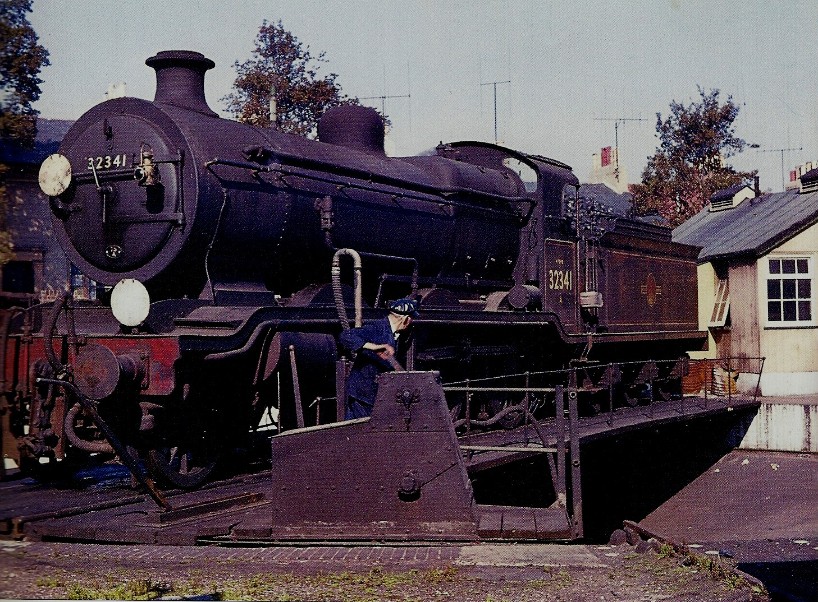
LOCOMOTIVE JOURNAL
JANUARY 1951
PAGE 24
BATTERSEA BRANCH.
Our recent meetings have been full of interest lately; attendance has been a little better, but still room for more to support our new secretary (Jack Fox).
Items from Head office that have given helpful discussion include 1950 A.A.D. decision on wages, although the pension position is still uppermost in our members’ thoughts in these days of our Nationalised industry. Our L.D.C. nominations of official candidate were supported for the next term of office. Bro. Sands gave us report from L.D.C. and also joint meeting with Electrical Area L.D.C.
Bro. A. Stanton was elected as our delegate for 1951 A.A.D. Our Chairman and several members of the branch enjoyed recently a memorable short stay in Holland.
The Editor informed me that, owing to lack of space in the Locomotive Journal, I would not be able to have the opportunity to enlarge on this visit; will the party please note. One little act that was performed in visiting a cemetery near Arnham, in the village of Velp, to pay homage to one of our fraternity’s son’s grave us the gratification of carrying out his wish.
Now, brothers, keep the branch room interest going, and support our Society’s effort on our behalf; this is NEVER wasted.
E.G. WICKHAM
LOCOMOTIVE JOURNAL
JANUARY 1951
LONDON BRIDGE BRANCH
Page 24
At our Branch Meeting on December 4, we had the pleasure of :l visit from our E.C. member, Bro. E. Cordell, who gave a very able report on many items including progress re Wages Policy Considering the bad weather conditions, the attendance was good. Of those member who regularly travel long distance to attend meetings we are justly proud; yet there are some, who live quite close, who do not attend. ’Twas ever thus!
The Branch mourn the loss, though sudden death, of Bro. C. Head, at the early age of 51. His cheerfulness and jovial manner did much to brighten our lives in the disgraceful mess room at London Bridge.
Great concern is being felt by members owing to the number of cases of Motormen receiving green light to enter Charing Cross with platform partly occupied, instead of having yellow light; we wonder what will happen if Motormen collide with a stationary train? There may be trouble.
On December 9, members and their wives visited the Prince of Wales’ Theatre, and afterwards had dinner at the National Trade Union Club. Our thanks to Bro. H. Rick, Social Secretary, and Bro. T. Poulter, for and enjoyable evening.
Best wishes and Success to all for 1951 from London Bridge Branch
W. AldermanBranch Secretary
LOCOMOTIVE JOURNAL
JANUARY 1951
SELHURST BRANCH
Page 26
CONDITIONS OF EMPLOYMENT AND FREEDOMSIR,- The lengthy quotation from Rosa Luxembourg to which I was referred by Bro. A. Irvine in the November-December LOCOMOTlVE JOURNAL was a singularly unfortunate choice as a medium of argument against my earlier letter on the above subject.
To the best of my belief, this quotation was taken from an article which appeared in the German theoretical Marxist review Nette Zeit in 1904 - long, long before the commencement of the painful evolution of Soviet democracy. Am I expected to accept Rosa Luxembourg as an authority on a governmental system which was scarcely was before she died ? If so, do I also accept her condemnation of the Webbs and other pioneers of the British Labour Movement contained in that same article, in which an analogy was drawn between the views of the Webbs, and the earliest Bolsheviks?
"Life in every public institution must wither away......."; public life gradually fall asleep....; and this in reference to the nation which saved our skins in the war against Fascism!
No Bro. Irvin, when I seek information on such things as conditions of employment in any country, I prefer the voice of contemporary investigators - in this case sounding phraseology of the foreign political theorist.
DON PULLENSELHURST
Extracted and adapted from
SEAFORD BRANCH MINUTES
January 11th 1951
Request from Bro. Allington, through Secretary for advice about the position of Motorman waiting for their final move to their home station, because of the manner in which the opportunity to do so is being retarded by the interpretation by Sectional Council No.2 of certain clauses in the new promotional scheme. some discussion took place on this matter and it is considered most in just for Motormen in such positions to be required to take their seniority with the dual link. Secretary instructed to write to Head Office.
LOCOMOTIVE JOURNAL
FEBRUARY 1951
PAGE 61
BATTERSEA BRANCH
At our December meeting, officers for the forthcoming year were elected, also the Social Committee. L.D.C. nominations for 1951 were dealt with, Bro. C. Cocks, A. Stanton and R. Weeks being nominated.
The proposals of the R.E. re wages claim was read and discussed. Deep concern was felt by the members present and Bro. Stanton, commenting on same, expressed the opinion that the conditions under which we were working were being retarded rather than advanced. He pointed out that if we were forced to accept these proposals we should have even less leisure time than we get at present.
The Chairman of the Social committee gave a short report on the progress of arrangements for Reunion Dinner to be held on April 28 for retired members of the staff, who are going to be dined and entertained by the Social Committee.
All though there was a fairly good attendance at this meeting, we are not getting the support of the younger members, and the Branch again appeals to those members concerned to attend their Branch meetings, for which hearty welcome will be extended to new ideas or suggestions that these members may have.
R.G. WEEKS
ASSISTANT SECRETARY
LOCOMOTIVE JOURNAL
FEBRUARY 1951
LEATHERHEAD BRANCH
The workers in our industry are viewing with great concern our long overdue wage increase claim, which our Society has put forward. It has been dealt with in a constitutional way and still no results. Other industries can make a wage claim as per the cost-of-living increase and settled pronto, but not so with one of the most important industries.
Realise most of our fraternity have spent most of a lifetime in the industry, shouldering responsibility more than any other trade; also working any hour day and night. Then we are told yes a rise, but smash up the maltreat our conditions of service. “What a sporting offer!”
We all hope and trust our Society will obtain our wage claim increase, preserve our conditions of service, also get our Pension included.
E.J. Beecher
Branch Secretary
A.S.L.E.& F.’s DESCRIPTION OF
VARIOUS FOOTPLATE GRADES
EXTRACTED FROM THE
1951 GUILLEBUAD REPORT
SEE SUB PAGE FOR FULL REPORT
THE CLEANER
It has been indicated that the lowest rung of the ladder of promotion is the cleaning grade, and I deem it necessary to point out that care is exercised by the railway authorities with the
object of ensuring that youths of high character are selected. So that in addition to all the
other essential features a youth must be of high character, having regard to the nature of his
duties. As a cleaner a youngster must in the course of his duties study the various types of
locomotive with which he daily has to deal in the shed. He must also acquire a preliminary
knowledge of signals and of rules and regulations for train working. This he must do in the
course of performing a dirty, greasy, exacting and essential role amid the conditions of smoke, steam, grime, and not inconsiderable physical risk associated with a Motive Power Depot.
The general conditions of the job are indeed such as are calculated to frighten away - and do
in fact frighten away - any lad who takes it on without any genuine sense of the vocation
upon which he is entering.
So the intending footplateman embarks upon his career - learning the rudiments of his future
job in the only way in which they can properly be learned - the hard and practical way. In due course, if he satisfactorily undergoes the technical test, he is passed for firing duties. These duties not only constitute a skilled job in themselves but are also a long course of preparation, lasting normally for a large number of years, for the ultimate stage of driver.
THE FIREMAN
The fringing of a modern locomotive is a scientific task, which has to be carried out with
constant and scrupulous care, in order theta punctuality may be maintained, together with the avoidance of undue strain upon those parts of the locomotive concerned with the maintenance of steam. In passing it may be said also that this principal task of the Fireman is today rendered more difficult and trying by reason of the inferior qualities of fuel which he now has to use.
In order to emphasise the point that the firing of an engine is work of a highly skilled
character, and for assistance of the Court in its deliberations on the present claim, I have
submitted, in my Statement Number 2, a few extracts from the latest edition of “Locomotive
Management,” by J.T. Hodgson and C.S. Lake - a standard text-book used extensively in the
engine men’s mutual improvement classes which are functioning in all parts of the country to asset cleaners and firemen to develop their abilities and their knowledge of the machine, etc.
I think these extracts will serve to make it fully apparent that the fireman’s job is a highly
technical one - responsible and of a vital nature in connection with efficiency and economy of operation alike. Further, I think they will show that the job is not only technical but also that, if the twin objectives of efficiency and economy jus mentioned are to be attained, it is a job which requires assiduous attention, concentration, and care; moreover, the amount of bodily effort alone involved in maintaining a locomotive fire at its maximum effective thermal power is at all times considerable, whilst on some engines it is very great indeed. Taken together with the other essential duties performed by the fireman during the course of a run - for example, assisting the driver in the observation of signals, keeping the footplate clear of coals and dust, carrying out certain braking operations at appropriate times, etc. - it makes up an onerous and truly “full time” job, of which I am profoundly desirous that the character and importance should be adequately appreciated.
M.I.C.s
At this point may I again refer to Mutual Improvement Classes which I have already
mentioned as being in operation for the purpose of assisting men in the grades of cleaner and fireman to improve their knowledge and to equip them for higher duty? These classes are attended by students in their own time, and are usually held on Sundays. Generally speaking, the accommodation is provided by the railway authorities. The instructors, who are qualified drivers, also engage in these activities in their free time. Now, the point I would like to emphasise as fully as I can is that here you have a body of people who have got to equip themselves, an in order that they may become efficient and may carry out this responsible job they sacrifice part of their leisure time in order that they might become accomplished. In that connection, Mr. Chairman and Gentlemen, I am glad to be able to add that for a very large number of years the Society which I represent has assisted this very praiseworthy movement by contributing a number of models of the working parts of locomotive for circulation among the local classes in the different parts of the country. We do that because of our interest and of our pride.
I thus make special reference to the Mutual Improvement Class Movement at this point in my observation because it is an important example of the locomotive man’s pride in craft, and of the voluntary steps which are taken in their own time by the senior men to pass on their knowledge of that craft and by the juniors to increase their theoretical and technical
equipment in connection therewith.
THE DRIVER
The duties of the Driver, though in reality, of course, highly technical, are perhaps such as to
be more readily appreciated by the public than are those of the Fireman. From start to finish
of a run the responsibility rests ultimately upon the Driver for the safety of his train, for
punctuality, for smoothness, efficiency and economy of operation. Reaching the driving grade after those many years of arduous training to which I have referred, he brings to his work a remarkable variety of skills. He must have a thorough knowledge of the practical working of the great and costly machine which is in his charge, and a complete grasp of the very numerous and important rules and regulations affecting his work. He must know his route and the swift succession of signals applicable thereto; he must be unceasingly vigilant, ready and able to take a split second decision and to act upon it instantly. By readily adapting his handing of the locomotive to the varying conditions applying at different given moments of a run; by noting from time to time the amount of coal consumed and keeping an eye on water supply; by constantly combining and deducing the net effect of factors such as the nature of the road (including gradients and speed restrictions), the weight of his train, quality of coal, engine condition, and so on, he must at all times ensure that maximum operating efficiency in the circumstances is being continuously achieved, with the minimum of wear and tear and waste. Drivers are also responsible for the examination and preparation of engines prior to their leaving the shed, and for reporting in writing upon their condition on completing the run.
The Driver is thus in all respects, by virtue of his duties, craft knowledge, and responsibilities alike, a key man of out standing importance in the vast organisation of grades which goes to make up the personnel of British Railways.
As to his practical knowledge, the following is a list of subject with which a candidate for a
Driver’s position must be thoroughly familiar if he is to succeed in attaining the desired
promotion:
Care and manipulation of the engine.
Reading Signals and judgment of distances.
Manipulation of boiler adjuncts and methods of controlling the fire.
Constructional details of the locomotive.
General methods of lubrication.
Methodical examination of the engine and reporting defects.
General knowledge of, and the proper application of, Rules and Regulations.
The construction and action of automatic and steam brakes.
The emergency remedying of failures.
Whilst it does not ale much consideration in order to visualise the very large field of skill and responsibility which, in fact, is covered by these broad and general headings, I have
additionally set out in my statement No.3 a selection of the detailed questions which an
engine man may be called upon to answer when examined in regard to his duties; and further, as he also has to be fully conversant with Rules appertaining to his duties, I have also given, in Statement No.4, a comprehensive list, by subject headings, of such rules.
These two Statements will in themselves suffice, I think, to demonstrate conclusively how
wide is the field of knowledge required of an efficient locomotive man, the range of the
responsibilities of locomotivemen and the important part which falls to them as a body of
trained key personnel in the service of British Railways and trading public.
THE MOTORMAN
Here it is a fitting that special reference should be made to the Motormen who man the
driving cabs of the train on the various sections of our railway that have gone over to
electrification during the half century just concluded. Such sections of line are to be found in
very different parts of the country, on the Southern, the London Midland, the Eastern, and the North Eastern Regions. The bulk of the electrified mileage is, however, as is well known, concentrated in the Southern Region. to quote approximate figures, out of a total of 900 electrified route miles on the whole of British Railways, just over 700 are on the Southern; and the Southern has about 1,800 electrified track miles out of a total of 2,300.
In these circumstances it is therefore appropriate that my remarks concerning the work of the motorman should, so that they may be confined to typical case deal specifically with the
Southern Region. The most characteristic feature of the work of the motorman is its very high degree of intensiveness and concentration. Members of the Court will probably know of the tremendous amount of passenger traffic which the Southern Electric services daily handle, especially suburban traffic, and traffic “ dormitory” towns and London. The routes which are covered in these connections are character sided not only by a multiplicity and constant succession of signals but also by a very high frequency of stops at intermediate stations. The enormous congestion and intensity of traffic at peak hours was recently underlined by the decision to introduce, as an experiment, double-decker coaching stock on the Eastern Section of the Southern Region. It has subsequently been again underlined by the conclusion now officially reached that the double-decker stock does not fill the because, in the words of a Press statement issued by the Railway Executive, “The rials have revealed that the advantage of extra seating capacity is more than out weighed by slower working in passenger stations owing to the longer time required for passengers to entrain and detrain, as the double-decker train affords one door per 22 seats compared with 10 or 12 in ordinary compartment stock.”
Thus the reason for experimental introduction of double-decker stock and also the reason for
its withdrawal alike demonstrate the terrific pressure at peak periods. The pressure upon the
motorman is correspondingly high. Nor is this in fact confined to peak periods, as can be
gleaned from my Statement no.5, in which I have set out full details of typical turns off duty in respect of Crystal Palace Low Level Electrical Depot on the Southern Region. On
examination of submission it will be note from these that the motorman in one case (Turn
No.42), in the course of a number of passenger trips and other duties, covering a total mileage of 114, stops and starts at 92 stations, and has to observe altogether no fewer than 321 signals.
This is apart from any signals that might be involved in shunting operations and the like. A
similar position is revealed by the other turn quoted (No.51).
These examples will serve to illustrate the pressure to which I have referred in a connection
with the motorman, due to the fact that the slighter relaxation during the course of his duties,
or failure to adhere to the exceedingly rigorous time schedule covering the whole of a trip
with its intermediate stops and starts, can very quickly derange the highly co-ordinated and
sensitive mechanism of traffic operation. May I add also with regard to peak hours that at
these periods the motorman of each train is responsible for the live of a very large number of
persons? taking actual seating capacity alone, accommodation is afforded for 772 passenger
in a normal 8-car train; and with promised introduction of 10-car trains of new design, seating will be provided for 945 passengers. It will, of course, be appreciated that during peak periods the number of passengers actually carried is far in excess of the number for whom seating accommodation can be provided! Members of the Court will have knowledge of that aspect.
May I further make the point for the information of the Court that the motorman, before
selection for employment in that grade, must be a fully qualified steam driver? Having regard to the foregoing facts, I desire to submit and to emphasise that the general conditions and duties attaching to electric working fully justify, in the case of the motorman, the claim which we are putting forward.
Before passing on the the next part of my case, I desire to deal with some of the indebted
drawbacks and disabilities which operate in connection with footplate work to a specially
marked degree.
COLLISION AT EASTBOURNE
2nd February, 1951
Eastbourne Crew
During the early 1950's there was a 6.40 p.m. Eastbourne - Polegate goods train, this train was usually a heavy formation and nearly always double headed. On the evening of 2nd February, 1951, the goods train stormed out of Eastbourne yard in fine style with engines Nos. 32543 and 42074 (L.M.R. 2-6-4T), but the road was set for the engine line instead of the up main. In the darkness this went unnoticed by the crews who also failed to notice to observe that the up advance starter, which was off was further east than it should have been, so the train continued to gain speed. It was only when the cavalcade was thundering into the shed yard and the electrical substation appeared to the right instead of the left that the crews realised all was far from well, and shut off steam, but too late to prevent a violent collision with N class 2-6-0 Nos.S1825 and L.M.R. tank 42065. Several of the enginemen were injured and all for locomotives considerably damaged. The guard was also badly shaken, but was able to leave his van and hurry back along the track to protect his train in time to stop engine No. 32538 from crashing into the wreckage.
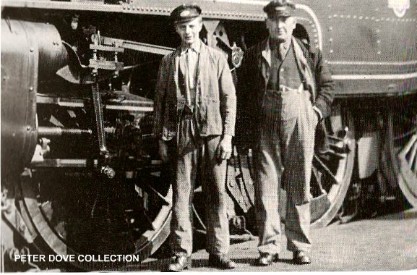
Left ~ Right:
Eastbourne Fireman Peter Dove & Eastbourne Driver Sid Peckham
LOCOMOTIVE JOURNAL
FEBRUARY 1951
PAGE 62
SELHURST BRANCH
We have had a busy year, and can look back with some measure of satisfaction if only because of the younger element that have attended Branch meetings.
In view of the new L.D.C. set-up, one which Selhurst does not agree with. I would appeal to all depots covered by the Branch to make sure they have regular attenders at meetings.
Depot representation can, if we let it, be the means of splitting the men; then selfish interests will prevail. Therefore let the slogan be: “To the Branch meetings regularly in 1951, and keep together!”
Bro. S.H. Armstrong has resigned as Assistant Secretary, and Bro. O. Mahoney elected in his place. Tribute was paid to Bro. Armstrong at the A.G.M. for the grand work he has put in over a number of years in close co-operation with the Secretary. Bro. J. Le Boutillier (Vice Chairman) sportingly stood down to allow Bro. Armstrong to be elected Vice Chairman for the two remaining he has to serve in the railway industry. Nice gesture, Jack.
We have several colleagues who are having a long term of sickness; to these, our best wishes for early return to normal health in 1951.
BILL BOULTON
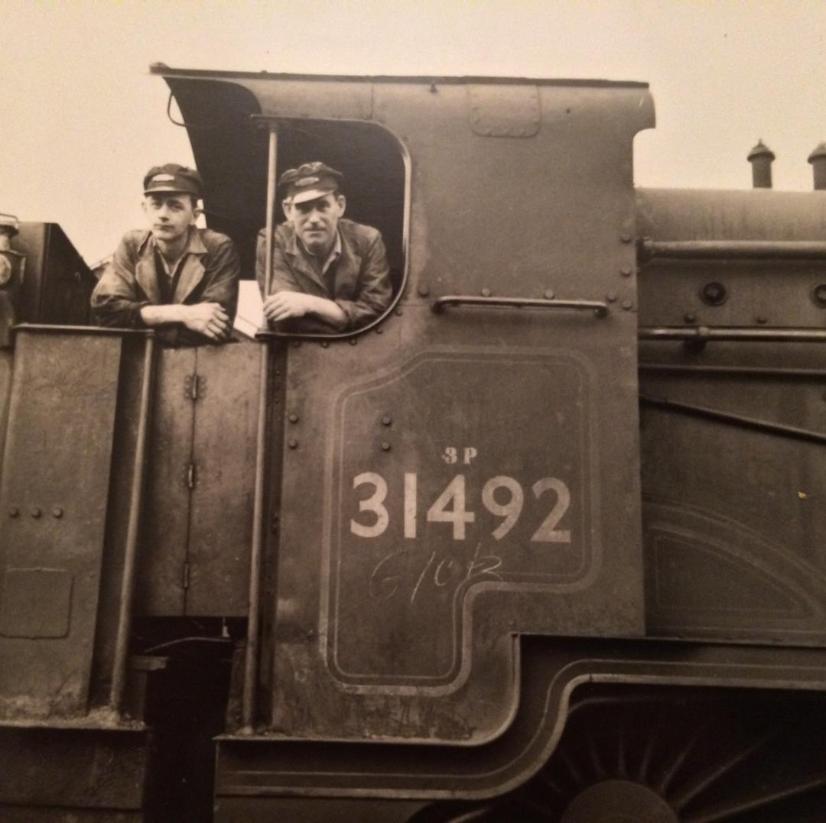
Bob Walls Collection
T.W.W. Fireman unknown & Driver Vic Rumley
LOCOMOTIVE JOURNAL
MARCH 1951
TUNBRIDGE WELLS BRANCH
The Children's Christmas Party held on Monday January 1 at St. Barnabas Hall, was indeed a fitting climax to a year's unselfish work by the branch social committee.
The ample spread, children's cabaret and the high spot of the evening, Father Christmas (ably performed by Bro. C. Adkin) handing the kiddies their toys from a brilliantly decorated Christmas Tree, was rewarded by the beaming, excited, some maybe a little cautious, but nevertheless happy face of the children.
Some of the old folk were there too, to join in the fun. all of us, both old and young, shared a very enjoyable party, and I should like on behalf of all members to thank the committee and helpers who did so much to ensure this success.
V.A. RUMLEY
LOCOMOTIVE JOURNAL
APRIL 1951
THE SETTLEMENT
BRITISH RAILWAYS
Last month as we net to press a position of further deadlock had been reached so far as
our wages claim for men in the line of promotion on British Railway was concerned.
Our Branches have been notified by Head Office circulars of subsequent developments.
For the convenience of members we reproduce on another page details of the settlement
which was eventually reached in the evening of Friday, February 23, after intensive
renewed negations with the R.E., following action by the Minister of Labour arising
from the impasse mention above.
It should be noted that whilst the wage increases obtained represent broadly at 7.5 per
cent. advantage generally, the increase to Drivers and Motormen on the top rate is one of 8.3 per cent. Further, the fact that the increases this time are on a percentage and not a
flat rate basis accords with the policy of relativity which the A.S.L.E. and F. has
consitenly champion. Having regard to the present financial structure of the Transport
Commission (a matter which continues to receive the active attention of our E.C.), and
to the fantastic nature of the commitments imposed upon the Railway Executive thereby, we are confident that our members’ verdict will be favourable as to the settlement achieved after what have been truly termed “marathon” negotiations.
During these discussions-as was the case at the Court of Inquiry and earlier-the subjects
of efficient working and economy were well to the fore; and credit is due to the clear and consistent policy of our Executive Committee for the fact that ultimately agreement was reached for the wages issue to be resolved separately, whilst at the same time provision was made for the setting-up of a Joint Committee to review the question of more efficient and economical working. The words of the proviso in the latter connection are also set out in this number of the JOURNAL for the information of members.
We desire to add that in our discussions with Mr. John Elliot, Chairman of the R.E., and
Mr. W.P. Allen, Labour Relations Member, it was plain to all concerned that a new
atmosphere was existent at national level. This is a good augury for the future, and we
do not doubt that it will find healthy reflection throughout the whole extent of British
Railways, with a determination on the part of all concerned to co-operate in the task of
making nationalisation a success, since its failure would react to the serious detriment of
staff and public alike.
THE CLOSURE OF
MIDHURST TO CHICHESTER RAILWAY
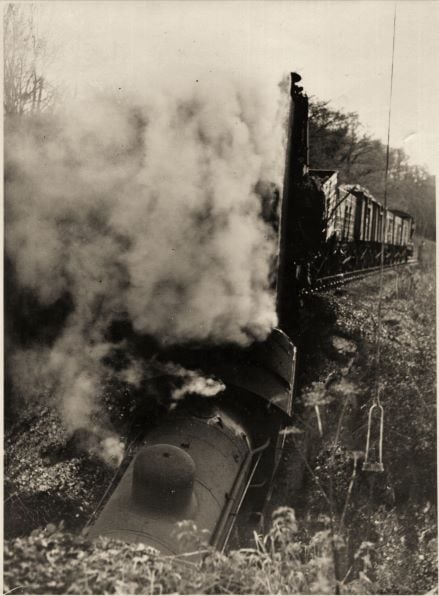
Alaric Charman Collection
British Railway decided to finally close the railway between Midhurst to Chichester 19th November 1951. This was due to part of the embankment was washed away during heavy rainfall.
Goods services from the Chichester end remained, serving Cocking, Singleton until the 28th August 1953 and Lavant in 3rd August 1968 for general goods traffic and for sugar beet in January 1970. In 1972 a gravel terminal was opened just prior to Lavant station that operating between Lavant and Drayton, and this service was closed in 1991.
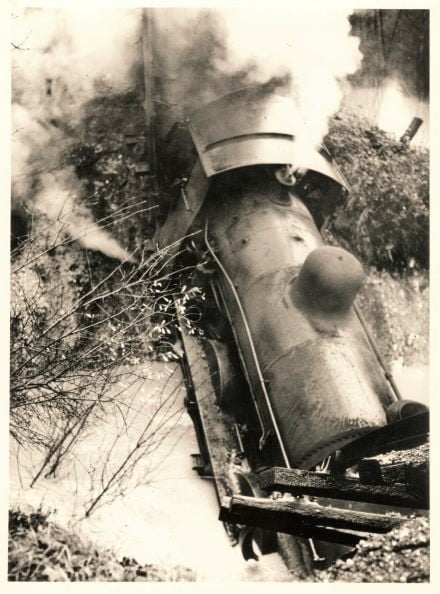
The last trip on the Midhurst Turn
Involving Bognor Enginemen
Driver Fred Bunker & Fireman George Howes
Two firemen Graham White & George Howes who were formerly of Bognor Loco Shed
Extracted from the book Going of the rails
The daily goods service between Chichester and Midhurst ceased abruptly in 1951. Bognor passed fireman George Howes has good reason to remember the event on Monday, 19th November 1951, he and his driver, Fergus (Fred) Bunker, left Bognor with a locomotive for Chichester to pick up the daily goods train for the trip up to Midhurst.
The weather was typical for November in 1951, quite different from today. In the 1950s and early 1960s there would be days, even weeks, during the autumn when it would rain and rain day in, week out. It had been pouring with rain all weekend and was still wet when the crew couple the locomotive to the wagons and pick up the staff at Fishbourne signal box on the start of the journey up the line. On such days, extra unofficial activities such as game shooting were not considered. The main aim was to keep dry. The normal routine of dropping off and pick wagons at Lavant and Singleton was carried out and now came the journey to Midhurst.
The downhill approach round into Midhurst was on a horseshoe shaped curve and the station could be seen through the trees.
George Howes just happened to be on the driver’s side of the engine when he looked down. In his own words, “I’d never seen so much water down there - it was like a river.” He crossed back to the fireman’s side of the engine but as they were on a curve he couldn’t see anything. On his return to his mate’s side he took another look, saw that there was no bank supporting the rails and jumped, followed by his driver. “We both jumped off the wrong side, but luckily enough of the trucks stayed on the track otherwise they might have come over on us.”
The engine carried on until the track collapsed under its weight and buried its smokebox in the mud at the bottom of the gully.
The tender shot straight up in the air and filled the cab with coal. Subsequently this caught fire and in turn set alight the anthracite coal from the crushed wagon behind the tender.
George Howes had landed on level ground and was unhurt but Fred Bunker had dropped down the bank, got wet up to his knees and had to hobble up from the bottom. George recalled “It was still very cold and not very nice and we were lucky we got off. If we’d stayed we would both been killed.” The engine had a full head of steam and we were frightened that if it dropped into deeper water then it would have exploded”. The guard, Albert Betterton of Littlehampton also jumped clear and was unhurt.
Both driver and fireman walked back up the line to be met by a policeman riding a bike between the track. At the Greyhound public house the signalman was telephoned and notified of the accident. It was a very dull and foggy day and the steam from the engine was blowing across the road. As the two men were approaching the station two ladies accosted them and complained bitterly of the noise and the damp, steamy mist. Midhurst and Petworth Fire Brigade turned out in full force and Midhurst Ambulance stood by as there was a distinct possibility of the locomotive exploding.
PHOTOGRAPHER UNKNOWN
PHOTOGRAPHER UNKNOWN
PHOTOGRAPHER UNKNOWN
On arrival at the station the crew were soon besieged by reporters, but the crew could not say anything until the matter had been reported to the Railway Inspectorate.The event made local news and the crew had a lucky escape which is personified in the late Fred Bunker as recalled by his fireman “If we’d been killed I would never had my first Christmas with my baby.” Fred had just become a father and it is a reminder that railway work had its dangers in which other unfortunate railwaymen paid with their lives.
It seems that the culvert running underneath the bank had been unable to cope with the water which in turn had pushed the bank away. The aftermath of this event was that the coal surrounding the engine kept burning for a couple of weeks. Attempts to recover the engine using a crane failed as every time the crane approached the scene the bank gave way. Eventually, the locomotive was extracted by removing the embankment for several hundred yards and laying a length of track along which the engine, former L.B.S.C.R. Class C2x No. 32522 was winched out.
The engine was sent for repair at Brighton in February 1952. George, who subsequently fired on No. 3522, thought it was better than before it had been put down the gully!
The Freight Services from Chichester to Cocking and Singleton ceased after the closure of both stations on 28 August 1953. Lavant remained open.
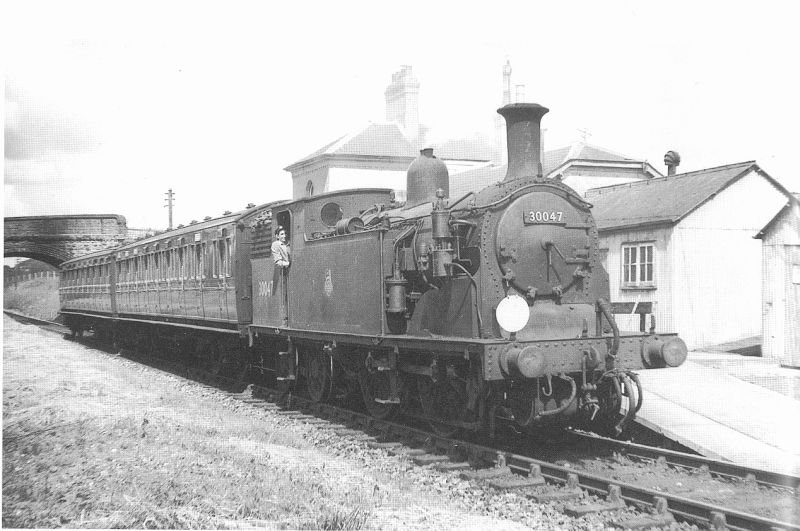
Photo taken by H.F. Weeller from the book Sussex Branch Lines
Horsham Driver Walter John Rowell at Elstead station on the
LSWR Petersfield to Midhurst line on the 18th June 1951.
Below information was sent to me from John Rowell Walter was at Horsham loco depot from the middle 1940’s to around 1955 or so we think and this is the only picture we can find of him on the railway, although we have been searching for years.
Father used to hold re-union meetings at our house before he died when some of his railway friends which included, Don Payne, Rodney Burstow, Jack Pitt & Bill Edwards are just a few names that used to come and they would reminisce.
Also, when dad was a fireman, Fred Goldsmith was the driver that trained my father
Dad used to say that he was filmed once for the B.B.C. television test transmission film and also for the series “Railway Roundabout” , and although we have the D.V.D. box set of the series, so far we cannot find any clips of him.
Could any one help John to find this clip
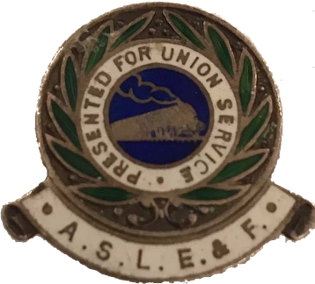
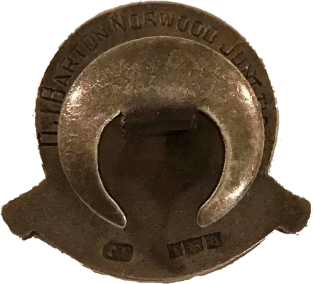
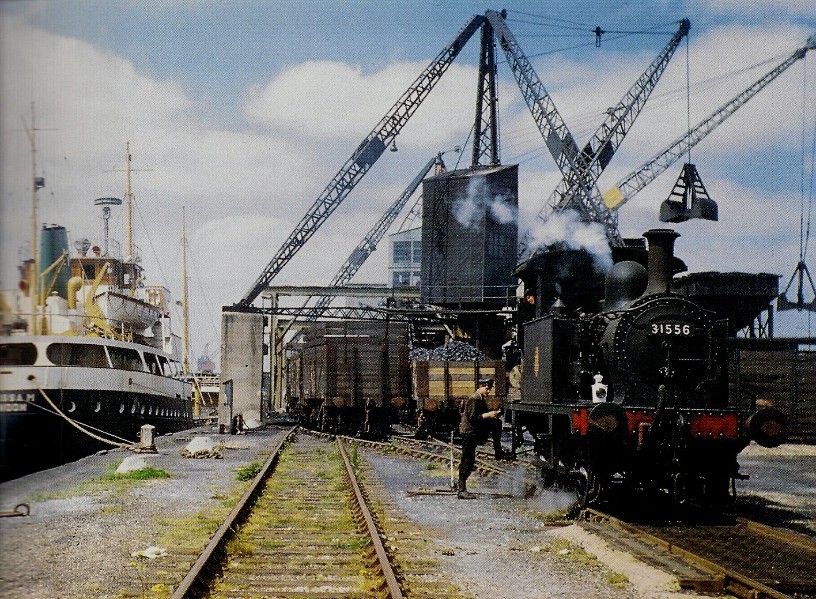
LOCOMOTIVE JOURNAL
1951
A Modern Magazine for Locomotive Engineers and Firemen,
and Electric Trainmen
Vol. 64 April, 1951 NO.4
~~~~~~~~~~~~~~~~~~~~~~~~~~~~~~
THE SETTLEMENT
BRITISH RAILWAYS
Last month as we net to press a position of further deadlock had been reached so far as
our wages claim for men in the line of promotion on British Railway was concerned.
Our Branches have been notified by Head Office circulars of subsequent developments.
For the convenience of members we reproduce on another page details of the settlement
which was eventually reached in the evening of Friday, February 23, after intensive
renewed negations with the R.E., following action by the Minister of Labour arising
from the impasse mention above.
It should be noted that whilst the wage increases obtained represent broadly at 7.5 per
cent. advantage generally, the increase to Drivers and Motormen on the top rate is one of 8.3 per cent. Further, the fact that the increases this time are on a percentage and not a
flat rate basis accords with the policy of relativity which the A.S.L.E. and F. has
consitenly champion. Having regard to the present financial structure of the Transport
Commission (a matter which continues to receive the active attention of our E.C.), and
to the fantastic nature of the commitments imposed upon the Railway Executive thereby, we are confident that our members’ verdict will be favourable as to the settlement achieved after what have been truly termed “marathon” negotiations.
During these discussions-as was the case at the Court of Inquiry and earlier-the subjects
of efficient working and economy were well to the fore; and credit is due to the clear and consistent policy of our Executive Committee for the fact that ultimately agreement was reached for the wages issue to be resolved separately, whilst at the same time provision was made for the setting-up of a Joint Committee to review the question of more efficient and economical working. The words of the proviso in the latter connection are also set out in this number of the JOURNAL for the information of members.
We desire to add that in our discussions with Mr. John Elliot, Chairman of the R.E., and
Mr. W.P. Allen, Labour Relations Member, it was plain to all concerned that a new
atmosphere was existent at national level. This is a good augury for the future, and we
do not doubt that it will find healthy reflection throughout the whole extent of British
Railways, with a determination on the part of all concerned to co-operate in the task of
making nationalisation a success, since its failure would react to the serious detriment of
staff and public alike.
LOCOMOTIVE JOURNAL
MAY 1951
PAGE 163
SELHURST BRANCH
A full house attended the branch annual reunion on Good Friday at the S.R.A. Club, East Croydon.
Our chairman, Bro. E.G. Cordell, welcomed all present, including our retired members and visitors, with Bro. A. Hallworth (Acting Assistant General Secretary). He then handed over the proceedings to Bro. Len Tavener, compere and M.C. for the evening, and right well did he work, keeping the cabaret and dancing going.
The artistes were Mick, Dick & Geo., a versatile trio; June & Pauline, juvenile acrobatic dancers and singers; Tom Bullen, Electric accordion; and Tom Kenyon, late “Stars in Battledress.” Dancing was to the music of Ethel Tulles and her band.
Once again a very fine programme, thanks to the M.C. who organised it, ably assisted by Bro. Spiv. Armstrong.
Our best thanks are also extended to the donors of raffle prizes and to the lady helpers who worked so hard to ensure refreshments being up to standard, and so contributed in no small measure to the success of the evening.
Branch meetings recently have not been so well attended as they might be. There are still stern times ahead. See to it, comrades, that we do not slip behind in any of the deliberations that are bound to take place in the very near future, and support your branch officers by attending meetings.
BILL BOULTON
LOCOMOTIVE JOURNAL
MAY 1951
PAGE 163
LONDON BRIDGE BRANCH
At our March meeting we had the pleasure of a visit from our Sectional Council member, Bro. M. Renshaw; his report did much to dispel many misunderstandings on motormen’s transfer and dual link workings.
I regret to report yet another death, of Bro. C. Cheeseman, 60 years of age, with a long record of trade union membership. Many colleagues of all grades allowed him to his resting place at Elmers End cemetery. Another day’s work o’ver.
W. Allderman,
Branch Secretary
Railway accidents on British Railways
Southern Region
Central Division
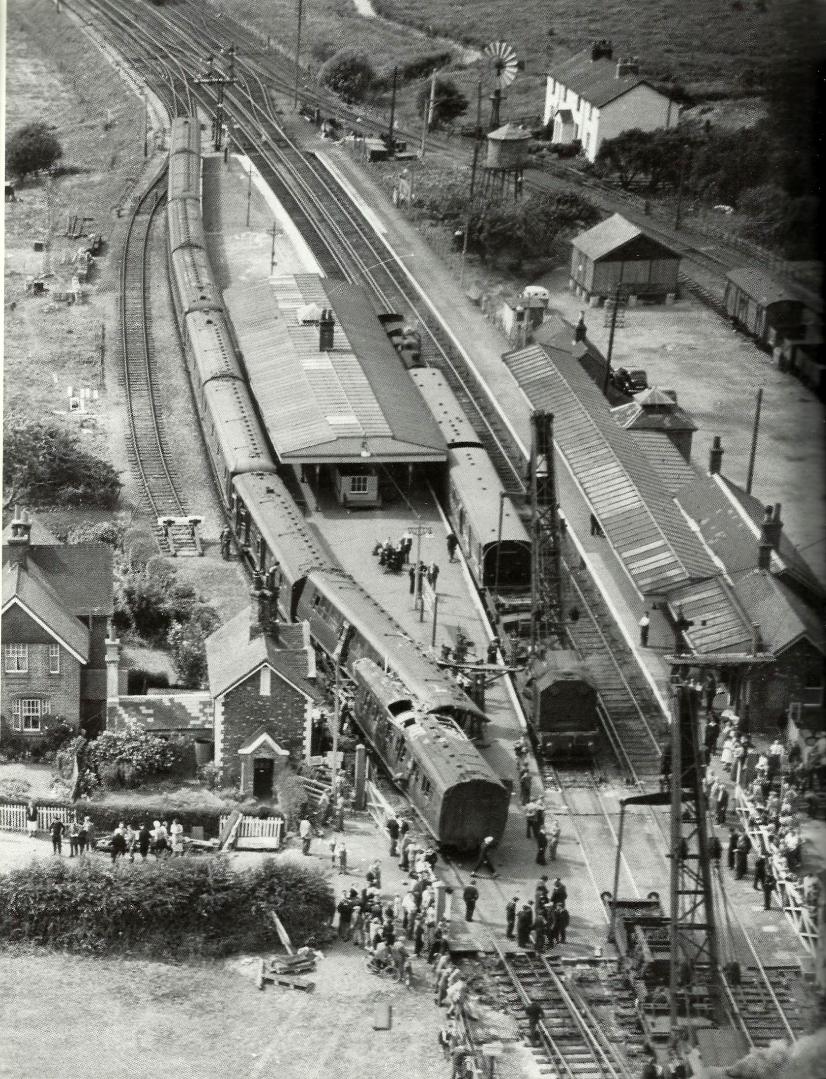
Ford 5th August 1951
involving Motormen H.J. West & Sherwood Depots unknown
SEE SUB PAGE